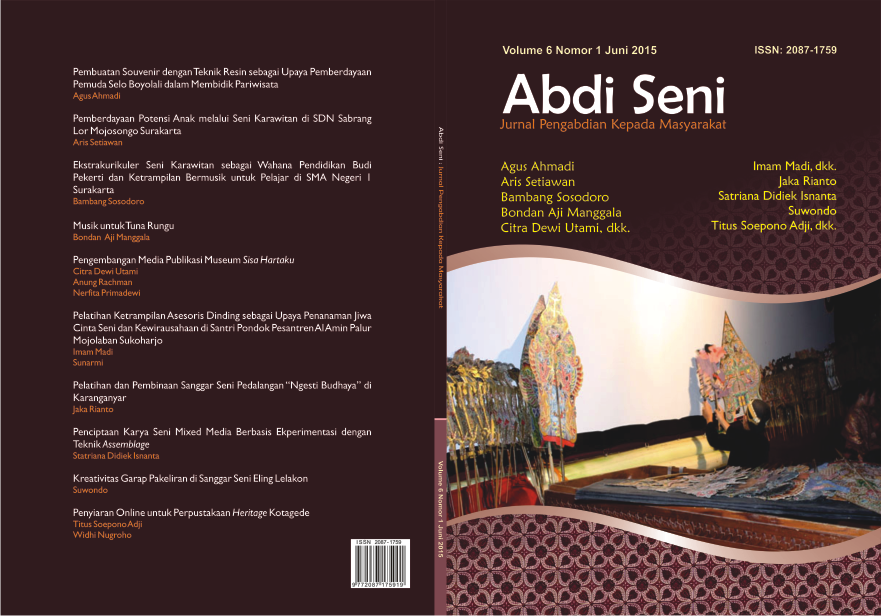PEMBERDAYAAN POTENSI ANAK MELALUI SENI KARAWITAN DI SDN SABRANG LOR MOJOSONGO SURAKARTA
Main Article Content
Abstract
Dewasa ini karawitan anak mengalami kemajuan, baik secara kualitas maupun kuantitas. Hal tersebut tidak lepas dari peran pendidikan baik di sekolah maupun di keluarga. Peran program sekolah dalam mengadakan esktra atau muatan lokal seni daerah juga menjadi jembatan awal pengenalan seni karawitan
terhadap anak-anak. Di samping itu, pemerintah daerah juga telah turut andil dalam menyediakan ruang khusus, atau ajang untuk mengekspresikan dan memamerkan ketrampilan memainkan gamelan bagi anakanak, seperti acara lomba karawitan, pentas seni, kreativitas anak Solo (Kreaso), dan lain sebagainya. Atas dasar kondisi inilah kegiatan PKM dosen turut ikut andil dalam menyumbangkan tenaga dan pikiran untuk kemajuan karawitan anak khususnya di kota Surakarta. Salah satu karawitan anak yang menjadi sasaran program PKM ini adalah SDN Sabrang Lor Mojosongo. Di tempat tersebut terdapat potensi
anak yang luar biasa dalam memainkan gamelan Jawa, akan tetapi kurang mendapat perhatian khusus, terutama dalam hal pembinaan. Target luaran dari kegiatan ini adalah memaksimalkan potensi anak-anak SDN Sabrang Lor melalui pelatihan karawitan, guna menghadapi lomba karawitan dan pentas seni.
Kata kunci: potensi, karawitan anak, gending dolanan.
Downloads
Article Details
License and Copyright Agreement
In submitting the manuscript to the journal, the authors certify that:
- Their co-authors authorize them to enter into these arrangements.
- The work described has not been formally published before, except as an abstract or part of a published lecture, review, thesis, or overlay journal. Please also carefully read Abdi Seni's Posting Your Article Policy at https://jurnal.isi-ska.ac.id/index.php/abdiseni/about/editorialPolicies#peerReviewProcess
- That it is not under consideration for publication elsewhere,
- That its publication has been approved by all the author(s) and by the responsible authorities – tacitly or explicitly – of the institutes where the work has been carried out.
- They secure the right to reproduce any material already published or copyrighted elsewhere.
- They agree to the following license and copyright agreement.
Copyright
Authors who publish with Abdi Seni agree to the following terms:
- Authors retain copyright and grant the journal right of first publication with the work simultaneously licensed under a Creative Commons Attribution License (CC BY-SA 4.0) that allows others to share the work with an acknowledgment of the work's authorship and initial publication in this journal.
- Authors can enter into separate, additional contractual arrangements for the non-exclusive distribution of the journal's published version of the work (e.g., post it to an institutional repository or publish it in a book), with an acknowledgment of its initial publication in this journal.
- Authors are permitted and encouraged to post their work online (e.g., in institutional repositories or on their website) before and during the submission process, as it can lead to productive exchanges and earlier and greater citation of published work.
Licensing for Data Publication
Abdi Seni uses a variety of waivers and licenses that are specifically designed for and appropriate for the treatment of data:
- Open Data Commons Attribution License, http://www.opendatacommons.org/licenses/by/1.0/ (default)
- Creative Commons CC-Zero Waiver, http://creativecommons.org/publicdomain/zero/1.0/
- Open Data Commons Public Domain Dedication and Licence, http://www.opendatacommons.org/licenses/pddl/1-0/
Other data publishing licenses may be allowed as exceptions (subject to approval by the editor on a case-by-case basis). They should be justified with a written statement from the author, which will be published with the article.
Open Data and Software Publishing and Sharing
The journal strives to maximize the replicability of the research published in it. Authors are thus required to share all data, code, or protocols underlying the research reported in their articles. Exceptions are permitted but must be justified in a written public statement accompanying the article.
Datasets and software should be deposited and permanently archived in inappropriate, trusted, general, or domain-specific repositories (please consult http://service.re3data.org and/or software repositories such as GitHub, GitLab, Bioinformatics.org, or equivalent). The associated persistent identifiers (e.g., DOI or others) of the dataset(s) must be included in the article's data or software resources section. Reference(s) to datasets and software should also be included in the article's reference list with DOIs (where available). Where no domain-specific data repository exists, authors should deposit their datasets in a general repository such as ZENODO, Dryad, Dataverse, or others.
Small data may also be published as data files or packages supplementary to a research article. However, the authors should prefer a deposition in data repositories in all cases.
References
Edy Sedyawati. 1980. Pertumbuhan Seni Pertunjukan, Sinar Harapan, Jakarta.
Martopangrawit. 1972.Pengetahuan Karawitan I. Surakarta: ASKI.
______________. 1985. â€Catatan Gendhing-Gendhing Dibuang Sayangâ€. Manuskrip. Surakarta.
______________. 1967. Tetembangan: Vokal Yang Berhubungan Dengan Karawitan. Surakarta: Dewan Mahasiswa ASKI.
______________. t.t. SekarMacapat. Surakarta: KonservatoriKarawitan Indonesia.
______________. 1988. Dibuang Sayang: Lagu Gérongan Gendhing-Gendhing Jawa. Surakarta: Seti-Aji.
Mloyowidodo. 1976. Gendhing-Gendhing Gaya Surakarta. Surakarta: ASKI.
Rahayu Supanggah. 2000. “Memberdayakan Seni Tradisi†Makalah disampaikan pada diskusi kesenian di STSI Bandung, tanggal 27 September 2000.
______________. 2010. “Kesenian Tradisi Sebagai Unsur Ketahanan Nasional†makalah seminar nasional di ISI Surakarta.
